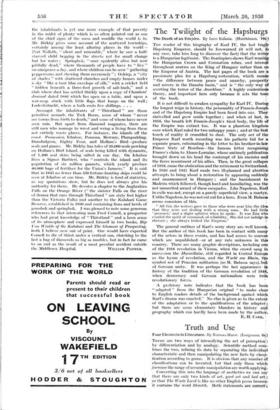The Twilight of the Hapsburgs
The Death of an -Empire. By loire-Battisa: Ifttitehiiison. "189
Tax reader of this biography of Karl IV, the last trade Hapsburg Emperor, should be forewarned (it will not,
any ease, take him long to discover the fact) that the writtie. is a Hungarian legitimist. The frontispieeeshows Karl weariw
the Hungarian Crown and Coronation robes, and inter*
throughout centres on the King of Hungary rather than On the Emperor of Austria. The last pages of the book are ,4 passionate plea for a Hapsburg restoration, which means " the difference between peace and anarchy, prosperity and misery in the Danube basin," and is " the only way of averting the terror of the Anschluss." A highly contention's
theory, and important here only because it sets the tone of the book.
It is not difficult to awaken sympathy for Karl IV. During the longest reign in history, the personality of Francis-Joseph and of the Hapsburg Empire had been fused into one. They shrivelled and grew senile together ; and when at last, in 1916, the breath left Francis-Joseph's tired body, the life of the Empire was extinct too. It was a phantom kingdom over which Karl ruled for two unhappy years ; and at the &it touch of reality it crumbled to dust. The only net of the Emperor Karl worth recording was his pathetic bid for 41 separate peace, culminating in the letter to his brother-in-lady
Prince Sixte of Bourbon—the famous letter recognising France's claim to Alsace-Lorraine; whose untimely publication
brought down on his head the contempt of his enemies and the fierce resentment of his allies. Then, in the great collapse of 1918, came the abdication and the retirement to Switzerland. In 1920 and 1921. Karl made two ill-planned and abortirl attempts to bring about a restoration by appearing suddenly and unannounced in Hungary ; and the banishment to Madeira which followed, though hard and humiliating, was the not unmerited award of these escapades. Like Napoleon, Karl in exile was not, except on a purely superficial view, a martyi.
Unlike Napoleon, he was not cut out for a hero. Even M. Batas* seems conscious of this. .
" All this (he writes) gave to those who wore near him the idol' that they were not dealing with a strong man. He had little presence,' and a slight splutter when he spoke. It was Zita with exuded the spirit of command, of reliability. She did not indulge as rhetoric ; she always looked the Empress."
The general outlines of Karl's sorry story are well know& But the author of this book has been in contact with many of the actors in these events, and has had access to source§
which are unpublished—or at any rate unknown in this
country. There are many graphic descriptions, including one of the 1918 revolution in Vienna, when the crowd sang in
succession the Marseillaise, still regarded in Central Europe as the hymn of revolution, and -the Wacht am Rhein, t symbol not of Prussian militarism (as M. Balassa says), b4 of German unity. It was perhaps the last appearance in history of the tradition of the German revolution of 1848, when democracy and German nationalism were twin revolutionary forces.
• A prefatory note indicates that the book has been adapted " from the Hungarian original " to make clear to English readers details of the background against which Karl's drama was enacted." No clue is given as to the extent of the adaptation or to the qualifications of the adapteil but there are some elementary blunders in history aril geography which can hardly have been made by the author.
E.-IL CARE.


































































 Previous page
Previous page